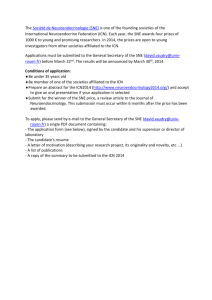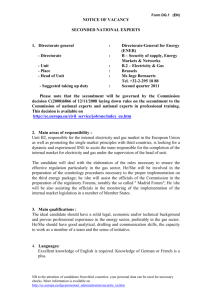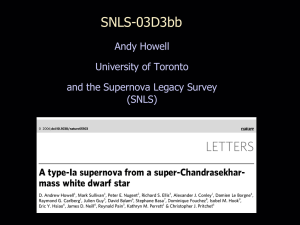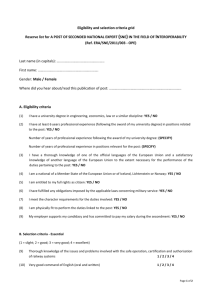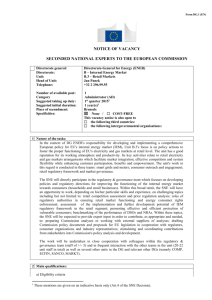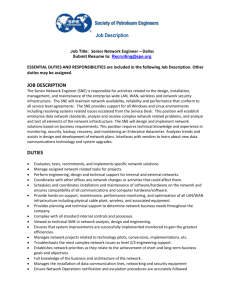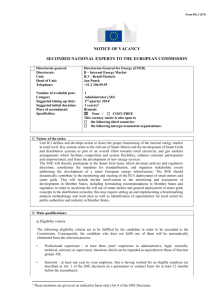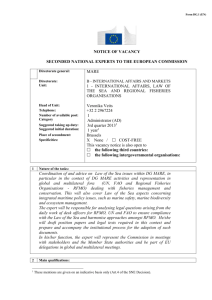Inclusion and Special Needs Education: Managing Change or just
advertisement
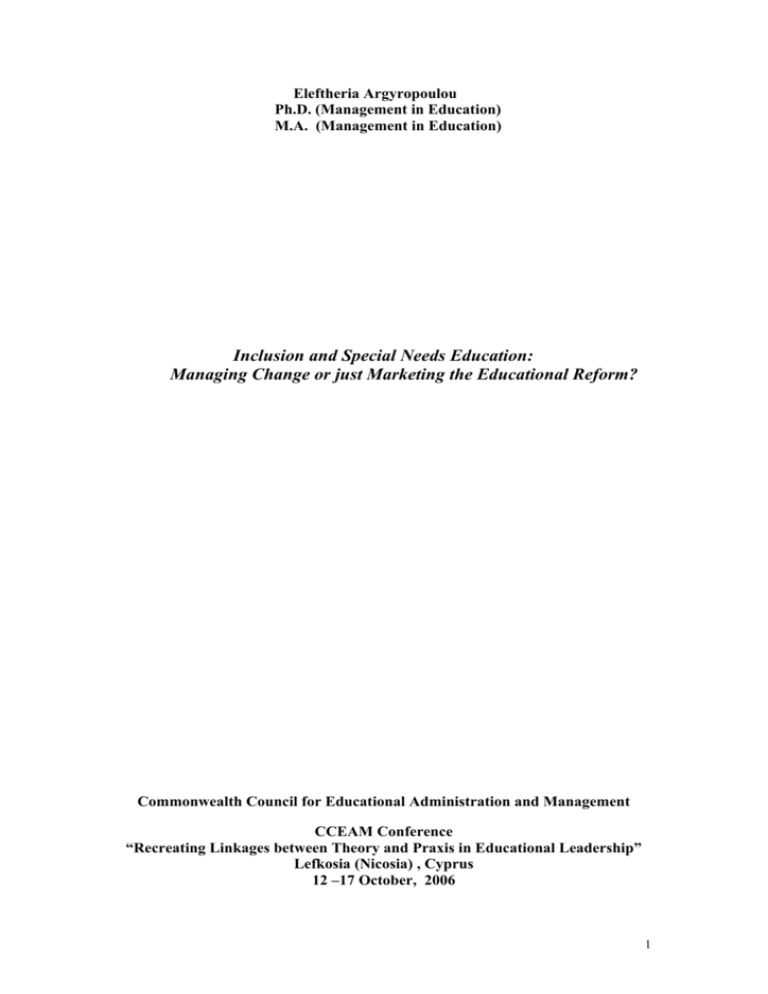
Eleftheria Argyropoulou Ph.D. (Management in Education) M.A. (Management in Education) Inclusion and Special Needs Education: Managing Change or just Marketing the Educational Reform? Commonwealth Council for Educational Administration and Management CCEAM Conference “Recreating Linkages between Theory and Praxis in Educational Leadership” Lefkosia (Nicosia) , Cyprus 12 –17 October, 2006 1 INTRODUCTION Special Needs Education (SNE) has been significantly developed in Greece for the last 25 years. The statutory framework, as it has been reformed by the L2817/2000, has been updated and brought into line with the European policy against Discrimination. Institutions are now required to be proactive in encouraging students and their parents to disclose a disability and to provide education opportunities for disabled students and/or students with learning difficulties. So far, various types of SNE have been developed: Special Schools, Mainstream Schools with provisions and arrangements for children with Special Needs (integration classes), Peripatetic Teachers, Special Needs Occupational and Educational Laboratories (known as EEEEK in Greek), Local Educational Authority SNE Diagnosis, Assessment and Support Centres (known as ΚΔΑΥ in Greek), etc. Moreover, action has been taken to organize and/ or improve Teacher Training Programmes to enable teachers understand the issues in Inclusive and Special Needs Education regarding implementation of new educational policies and practices. It is true, though, that more emphasis has been put on Primary Education, within the boundaries of which a remarkable number of educational structures has been developed. Nevertheless, a great deal of SNE problems remains unsolved. The new trend, under which the most recent L2817/2000 has faced SNE in Greece, made clear that there is a noticeable structural “gap” in terms of Organization and Management in Special Needs Education. It has been expected, however, that newer legislative regulations would help to bridge this gap. The newly elected and appointed Conservative Government- wishing to reform Education- "tackled" the SNE issue by proposing a new Bill. 2 1. THE PHILOSOPHY A number of implications underpin this study: • Knowledge is only of significance if it is based on observations of external reality. • Science proceeds through a process of hypothesizing fundamental principles and then deducting what kind of observations will demonstrate the truth or falsity of these hypotheses. • The observer is independent of what is being observed • The choice of what to study and how to study it can be determined by objective criteria rather than human beliefs and interests. 2. HYPOTHESIS AND PROPOSITIONS The structural gap mentioned above consists of many SNE sections which have not been developed yet or have been underdeveloped. Research can provide feedback for planning educational policies as well as strategies for practices and set new educational structures accordingly. In other words, a theoretical background is necessary to introduce reform. Reform is worded in legislative regulations. In bureaucratic educational systems legislation is of prime importance regarding the implementation of the proposed changes. Discussion in this paper seeks to investigate the SNE “areas” that have not been properly surveyed and organized in the present situation so as to provide an organizational framework on which new legislative regulations can be built. 3. OBJECTIVES Identifying specific objectives will help choose the research method and add to the theoretical approach of the issue, the analysis of data and the reach of conclusions. So, the prime objectives of this study are the following: • To consider SNE as an organizational system within the framework of the Systemic Theory without intervening with purely medical, psycho-pedagogical or educational matters. • To stress the idea that SNE – as an organizational system- should be seen as part of the National Educational System , being worth of special attention and specific Educational Policy • To offer insight on the general need of profound and holistic theoretical analysis on each and every educational issue prior to any legal arrangement. • And, finally, to question whether the newly proposed bill is able to introduce change and reform to the existing SNE status. 2. THE METHODOLOGY We have concentrated on the retrieval of information from legal documents, government publications, books, etc., as they are the most productive primary sources for a small –scale project. At this point we agree with Baker and Carty (1994: 225) saying that “when time is limited, an approach to a few carefully chosen sources will probably produce more than enough references, especially as, once traced, all the material selected as potentially useful has to be read”. 3 Consequently, the methodology of Documentary Analysis or Content Analysis has been implemented. Content Analysis has been defined in various ways. Krippendorff’s definition (1980: 21) that “Content Analysis is a research technique for making replicable and valid inferences from data to their context” seems more complete and – though perhaps over-inclusive in not making clear that various kinds of data are dealt with - does have the virtue of stressing the relationship between content and context. According to Robson’s observation (1994: 237) “this context includes the purpose of the document as well as institutional, social and cultural aspects; it also emphasizes that reliability and validity are central concerns in Content Analysis. 3. LIMITATIONS For more than twenty years there has been increasing emphasis on the need for talented and gifted children to be educated under special arrangements and to be treated as an individual category of Children with Special Educational Needs. In Greece, the Pedagogical Institute has done a marvellous job on “Talented Children” by publicizing a concise Guide to their Education. In this study, however, this category of special children has been deliberately excluded, as it is believed that their needs are less crucial compared to those of children with disabilities and that talented children – in any case – will be able to manage and adapt better in later life than other special children. 4. LITERATURE REVIEW Although a great deal of books, studies, papers have been written and research has been conducted on medical, psycho-pedagogical and purely educational SNE issues in Greece and abroad, it seems that only a small number of researchers have tackled the issue of Organization and Management in SNE. Literature available usually contains government reports or government-related publications on the number of Special Schools and the educational policies and practices in SNE. All these documents show a more or less bureaucratic approach on the way SNE is formulated within the broader educational system and tend to “boast” about the state concern on the matter. Legislative documents, on the other hand, outline the policies and practices on SNE in a more “austere” and rigid way. From these two types of documentation only the first provides some sort of critical analysis, however restricted, so as not to transgress the “bounds” set by the government policy. In this paper both Greek and English government documents have been used. The first have been the core elements of the discussion while the latter helped enormously in translating properly the SNE terms and in providing a platform of comparison to what happens in another European Union member state. Greek documents included: a. the Report on “Maping the SNE schools”, a survey conducted by the Pedagogical Institute in 2004 b. the Guide for Children with Excellent Skills and Talents c. the SNE leaflet of the Ministry of Education d. the SNE statutory framework 1981-2006, that is a collection of laws, degrees and circulars issued during this period, the majority of which are still totally or partially valid 4 The English documentation which helped the author to the translation of terms includes mainly publications of the Department of Education and Skills, U.K., and included: a. the SEN Document List b. a Guide to the Law for School Governors c. the brief on the Disability Rights Commission d. the Discrimination Act e. the SEN policy Moreover, the draft of the new Greek Bill on SNE prepared by the Ministry of Education provided the opportunity for discussion and comments in this paper. References on organizational theory and educational reform can be found in various (international and Greek) books and articles cited in each case accordingly. A book, published lately in Greek, by C. Syriopoulou, titled “Education in postmodern era: the case of Special Education” seems to be a serious attempt to see SNE as a separate organizational system within the Greek educational system and the society. In this book, reference is made to all details that compose what is called Inclusion and Special Needs Education, with emphasis on the SNE policies implemented throughout the 20th century. It is shown that every step the State took in the past concerning SNE was closely interwoven with the psychiatric and medical development while lately special children are seen as part of the “student force” and they demand a form of education tailored in their own needs. The book is obviously based on the writer’s doctoral dissertation titled “’The late appearance of Special Education in Greece 1821-1995, with reference to the role of Headteacher in Special Schools in Greece”. Although SNE has been a distinct part of Teacher undergraduate studies in Greece for more than 12 years, the Management of Special Schools has just appeared “timidly” in Teacher Training Curricula, especially in Primary Teacher Training Postgraduate Programmes. Very few case studies on Management of Special Schools have appeared - mostly unpublished – mainly in the form of Master’s dissertations. In their great majority, they are written by in-service Primary Teachers studying in postgraduate Programmes. In these projects prominent is the worry about knowing how to apply Theory in every day special school routine. 5. THE CHANGING CONTEXT OF THE SNE POLICY IN GREECE In the 70’s, the Greek State’s concern about children with special needs was expressed by the establishment of 40 Special Schools for “mentally retarded and abnormal children”. Only some of these schools really worked. After that, measures about Special Education were fragmentary and there was no continuous provision for SNE. In the beginning of the 80’s the statutory framework for SNE was set by the introduction of the L1143/1981. Diversity from ordinary educational needs was accepted as part of social differences. Many of the provisions in present legislation can be traced back to the 1981 law. Greece tried to update the educational policies for Special Children at the same time as other European countries. In the United Kingdom, the Education Act of 1981 made provisions and arrangements for Special Children based mainly on the findings of the Government Committee of Enquiry under Baroness Warnock (which reported in 1978). Legal provisions and policies updating were deeply influenced by the European Community Directives about SNE, as member- states have been mainly financed by 5 the European Commission. From 1981 until 2002 a number of laws have been introduced and Greece “co operated- through a number of programmes, such as ARION, HELIOS I AND II- with other member states in order to exchange information and to form a common education policy” (Syriopoulou, 2003: 156). European funding of SNE started in 1994 and aims at upgrading the educational infrastructure, teacher training, sustaining the LEA Diagnosis, Assessment and Support Centres and supporting all children defined as Special (DfE leaflet about SNE). Moreover, modern “trends” in educational policy- making, such as diversity, multiculturalism, new educational technology, etc., have influenced the SNE development in Greece. Thus, individual differences and the right for equal opportunities in Education are respected; in addition, medical and technological advances are taken into consideration in the assessment of special children. All these have resulted in building parents and carers’ confidence in the state provisions for SNE , helping them to accept their children’s diversity, setting them free from prejudices of the past and , finally, guiding them to help their children “stand on their own feet” and be more independent. However, there is still a long way to go for SNE in Greece in terms of organization and infrastructure. Legislation so far has dealt with National SNE Curricula modification, Special Teachers’ appointments and categorization of Special Needs; less attention has been paid to Secondary Special Education or to the Vocational Education and Training of Special Children. 5. THE NOTION OF THE ORGANIZATIONAL FRAMEWORK: a. The Bureaucratic and the Systemic approach. Kantz (1964: 34) for the first time characterized the Educational System as a “complex social organization”. He specified it as “complex” because it includes many different persons who interact in their performance of many different functions and “social” because the participants are interdependent and “their actions are socially promulgated and enforced”(ibidem :428). Going further than that Harling (1994: 20) claims that the Educational System as a whole is an “organization” that it possesses constituent “organizations” at various levels. The distinctive characteristic of an organization is that it has been formally established for the explicit purpose of achieving certain goals. Every organization has a formally instituted pattern of authority and an official body of rules and procedures which are intended to aid the achievement of those goals. However, alongside this formal aspect of the organization are networks of informal relationships and unofficial norms which arise from the interaction of individuals and groups working within the formal structure (formal and informal groups of pressure, see also, Michopoulos, 1998: 137-138). In the case of the Educational System, how do all these formal and informal networks work together, how are they structured and how do they interact? Under what perspective is the administration and the management of the organization carried out? The most widely recognized framework for understanding formal administration and supervisory structures is the bureaucratic model first articulated methodically by Max Weber (Harling, 1994: 21 and Michopoulos, 1998:39-48). Weber (stated in Harling), believes that “the decisive reason for the advance of bureaucratic 6 organization has always been its purely technical superiority over other forms of organization”. A lot of studies have been done on how Weber’s model of bureaucracy is applied in schools and educational systems. In Greece the most popular is that of Andreou and Papakonstantinou (1994), incorporating a great number of practices proving the bureaucratic perspective of the Greek Educational System. According to Harling, there several distinct features of the Weberian model that ascertain the extent of bureaucracy in education and its effect on educational administration, leadership, decision-making and organization, such as the distribution of organizational tasks, the hierarchical authority structure, the formally established system of rules and regulations governing official decisions and actions, etc. In 1957, Getzels and Guba introduced the notion of the social systems model, which was later extended and modified by Meyer (1978) and Hoy and Miskel (1996). In this new perspective, modern organizational theory is rooted in the social sciences which emphasize the importance of the individuals and their interaction within a certain social system (human relationships) and/ or other social systems (Michopoulos, 1998: 74). As far as the educational system is concerned, its constituent organizations individually and collectively respond to stimuli from their social environment and they also affect the environment with their “output”. Since the educational system is a “human organization”, its organization and management should therefore be concerned with two different dimensions: the “nomothetic”(legislative) and the “idiographic”(personal), as Harling calls them; more specifically, leaders and decision-makers should take care of: a. the survival and maintenance of the school system b. the appropriateness of the educational goals, c. the welfare and the development of staff, and finally d. the intellectual, social and emotional development of children/ students who use and benefit from the educational provisions. It is most likely, however, that in every educational system there is a “mixture’ of both perspectives with a good deal of inferences in individual aspects of the educational process. Modern Educational Systems tend to be more open nowadays although they do not manage to “mature” and free themselves and their individuals from the dominance of bureaucracy. b. Assessment and Evaluation of Organizational Performance. According to the bureaucratic/rational perspective organizations are purposeful goal-seeking entities which use techniques to enhance their ability to survive and prosper. Therefore, evaluation is undertaken to ascertain how closely objectives are achieved, why discrepancies arise and what action can be taken to improve performance. Thus, the results of evaluation serve as feedback for further corrective actions. On the other hand, the political/subjective perspective share the view that concept of an organization’s goals is meaningless. If objectives are pursued at all they are those of particular interest groups not of the organization as a whole. It is obvious that in this approach the focus is on the meanings individuals attach to organizational activities. Education practitioners, though, seem to amalgamate elements from both perspectives as well as from other newer approaches (collegial or ambiguity 7 perspectives, for example) according to the needs of their institutions or to the relativity of circumstances. In any case, however, it is clear that any evaluation and assessment form introduced for the first time may be rejected by institutions, social partners, syndicates, etc. because it often clashes with the up- to- that date culture, the interests of groups or individuals or with the decision- making itself. 6. CHANGE AND REFORM All types of organizations today are obliged to make changes in their way and form of function so as to meet the leading changes in their external environments. Changes in various aspects of socio-political life push organizations to adopt various approaches in accomplishing their goals or to implement innovations so as to achieve viability. There is a number of factors that affect organizations and lead them to introduce changes. Michopoulos (1998: 109-113) suggests, among others, the social dislike for the outcomes of the organization, discrepancies among organizational sub-groups, deficit function, lack of goal achievement, etc. Hoyle (1994: 126) argues that “there is a pathos inherent in all organizations which arises from the chronic discrepancy between proclaimed organizational goals and their achievements”, while Barr Greenfield believes that there is excessive concern for change with the structures and progresses within an organization rather than with people working in it (1994: 81-93). Whatever the factors, agents, purposes or aims of the change are it is certain that they involve new dynamics and may be seen in three levels, when they regard educational change and reform: a. cultural changes, freeing people in the organization from past practices and attitudes b. structural changes, required for the implementation of the reform agenda c. skill changes, providing a broader range of skill sets, necessary to manage change effectively. From this point of view, change and reform focus on the organization as an entity including both people and structures in a balanced proportion and providing a theoretical basis on which to plan, to prepare and to implement change. 7. THE SNE ORGANIZATIONAL MANAGEMENT OF CHANGE. FRAMEWORK AND THE Discussion so far has contributed to formulating a background on which change within an organizational system can be approached. It also put forward a certain set of principles on which the SNE Management and Change should be considered. In short, we argue that SNE is an integral system within the broader Educational System, interacting with it as well as with the prevailing social system. It affects both while, in turn, it is affected by them. Consequently, as (both) the prevailing social system and the broader educational system change, SNE should also change, either by reforming, remodelling or improving existing structures or by introducing new ones. Thus, change and its management in the case of SNE in Greece should be consider the following areas: 8 I. Management of SNE as a whole. SNE is viewed as an interactive sub-educational system. In this capacity SNE concentrates all the features of an organizational system and doing so “demands” further development: expansion or completion of its sections, a sound and profound infrastructure, appropriate staffing, research and professionalism. Such development presupposes a cultural change (that is: change in attitudes towards discrimination, racism, special needs). It means the acquisition of a certain degree of flexibility in the State-directed and – administered services and staff so as to be freed from old-fashioned micro-political tactics and traditional notions of their roles and adopt a more flexible team-working. However, changes of this type take a long time to be implemented, thus making “brave” educational policies ineffective in the long run. Therefore, it is accepted a priori that changes will cause various reactions- sometimes stemmed from unexpected variables- and this will result in slower development. It is self-evident that under SNE development lie implications of a broader reform agenda embedding administration improvement, bigger financial contribution and professionalism on behalf of not only the teaching, medical or psycho-pedagogical staff but the state services and the whole society, as well. II. Management of Special Schools “Special Schools address students with divert educational needs compared to conventional school students” (Syriopoulou, 2003: 61). Each student has a particular problem and requires particular treatment. This fundamental feature automatically differentiates the function of a Special School from that of a conventional school in the idea that uniformity of operation, compliance with general regulations, standardization of textbooks and syllabi, fixed numbers of teachers per number of students, etc. become impossible. New operational principles and values are introduced: flexibility, patience, sensitivity, individual tutoring, special knowledge, new professionalism. As a consequence, the Special School Head teacher, although still considered the “core” and “inspiration” of the school and still “loaded” with all the administrative and managerial duties of a conventional school Head, finds him/herself into a brand new leading role: • to co ordinate various and divert teaching and therapeutic groups of staff [participating in the operation of the Special School], • to communicate –in the best possible way- with all of them conveying the “messages” of the one part to the other without any type of “interference” • to “smooth” down possible conflicts • to care for the peace and quietness of the school [which is tense and turbulent a priori] • to facilitate the communication and interaction among staff, parents, social partners(if there are any) and students. These differentiated managerial duties demand a complex set of values, studies and experience for the Special School Headteacher. However, it is obvious that such a person cannot be an “Iron Man”. Undoubtedly, s/he should have a higher degree of educational background as well as special leading and communicating qualities to enable him/her to carry out his/her multiple duties. But s/he cannot fulfill all his/her 9 tasks at his/her good will. This is where the State Concern should be present. If care has been taken in terms of a complete organizational framework, consequently support will be likely to be provided by the organization itself so as to alleviate additional pressures often placed on the Head. In other words, a remodelled, more flexible organizational operation of the Special School will supply a platform for both the Head, the teachers and the students to work together. III. Management of Special Needs in a Mainstream School. It involves special educational arrangements for a child to be taught in an ordinary class or in a specially resourced provision unit attached to a mainstream school. It is often argued that this type of schooling refers to children with minor learning difficulties, such as dyslexia, dyscalculia, etc but it could not be possible for children with severe physical disabilities. In this type of schools one or more Special Teachers should be appointed not only to carry out the teaching tasks but to serve as SNE Coordinators. For economy purpose though, the Head or the Deputy usually take on this role. There are advantages and shortcomings in this type of Special Education: a special child still remains part of the school micro-society and his/her integration is encouraged and facilitated but –at the same time- there is a risk of discrimination ( or mockery or –sometimes- bullying) from other, “ordinary”, children. Also, sustaining integration units in a mainstream school means extra costs, as individual needs require individual education and care at multiple levels of provision. Managing Mainstream Schools with Integration Units or Special Provision Resources seems the hardest Headship task. Apart from all the leading capacities mentioned in the previous case [of “purely” Special Schools], the Head faces the ordinary children’s discrimination challenges and is obliged to continuously watch the delicate balance keeping among students. The whole teaching team should also be prepared to do so and adapt their teaching methods accordingly, avoiding any discrimination against learning diversities. IV. New Teacher Professionalism It should be acknowledged that in both school cases discussed above (ie Special Schools and Mainstream Schools with SNE provision), the Head and the rest of the teaching team have already been aware of the particularity of their Special Students’ Needs and are well prepared to work towards improving their attainment. Hence, attention should be drawn to the Teacher Training process. State intervention is necessary for an organized, periodical and continuous training process but this is not sufficient. Teachers, on their behalf, should see professional development as an ongoing part of their everyday activities rather than a separate activity which adds to their workload. Change of teachers’ attitudes towards training is one of the cultural changes needed for the development of SNE and the Educational System as a whole. V. Organizing, Extending and Remodelling SNE sections and services. Managing SNE change in Greece underpins the need for improvement of educational and socially based structures. There are four main areas of interest in which progress should be made: 10 a. Secondary Special Education. According to the Pedagogical Institute Research (2004: 201), only the 5,7% of the existing Special Schools belong to the Secondary Education. It seems as every attempt to educate special children stops at the age of +/- 14. Although, since the beginning of the 90’s some writers (for example, Delassoudas, 1994) have pointed out the need for the continuation of Special Education after that “threshold” age, only a few steps have been made so far. It is widely thought that this lack of Secondary Education structure is also connected with the lack of jobs for special people in the market. Moreover, it partially justifies parental attitudes towards SNE, as it will be seen further below. Certainly, there is a limited number of Secondary Special Schools or an alternative of Occupational and Educational Laboratories for Special Students but they are all gathered in urban areas. Special Education, as a teaching subject, is also missing from Secondary Teacher Training Curricula and there is not [so far] appropriate provision for such Secondary Education Studies at undergraduate or postgraduate level. b. Cooperation between SNE Diagnostic and Assessment Centres (DACs) and Schools Diagnostic and Assessment Centres, as an institution, still have a “very short life”. They were firstly introduced in the beginning of the millennium. Their main responsibility is to issue a SNE statement – usually on an annual basis- identifying the child’s special educational needs and outlining the provision to meet these needs either in a mainstream or a special school. There is a strong belief among – especially Secondary mainstream - teachers that SNE/DACs, since the SNE statement is issued, take no responsibility any longer. Teachers expect the DACs personnel to communicate with them with regard to students’ attainment and to invigilate children’s progress. Mainstream- school teachers often ask for specialized help, which DACs personnel can offer, but they are unsuccessful. Provided that there is an inherent lack of Special Training for Secondary Teachers, teachers are left alone to find ways to educate a special child in an ordinary class. c. Evaluation of SNE organization and infrastructure. No matter from what point of view (rational or political) the issue of evaluation is seen, it is totally agreed that it should take place in an organization. Even though SNE policies have seen many changes so far, evaluation of SNE existing structures has not formally taken place, constituting another “gap”, that of feedback and information. It would be argued that the attempt of the Pedagogical Institute to map the existing SNE infrastructure was a single example. It provided a first-hand bank of information for further research and action. Any attempt of evaluation should be carefully researched and planned. Criteria and performance indicators should be set and piloted in advance so as to provide information needed and be of any use for further development. Prior evaluation results should be taken into account (and used as feedback) for decision-making and the introduction of new legislation. 11 d. Parental Consent and Cooperation. Very often teachers in conventional Primary School classes note some children’s learning problems, even though they are not qualified SNE teachers. In many cases they approach parents and offer guidance so as they (the parents) seek professional help and diagnosis. Parents are - still in our days- reluctant to accept professional advice believing that discrimination towards their child will “ruin” his/her future. Many children with learning difficulties go on ordinary schools throughout their school life merely because their parents refuse to acknowledge their children’s special needs, cooperate with the educational authorities and give their consent for them to follow Special Education programmes. In similar cases it is the State’s concern and responsibility to intervene by setting appropriate regulations and structures to assess children’s learning skills and abilities at an early age (pre-school and/ or early primary years). Clear expectations set out in this domain underpin a coherent organizational framework of parents’ information and early- year child- assessment services. Research should be taken on to find ways to “eradicate” attitudes of discrimination both on societal and parental level. The underlying problem here is extremely complicated and the organizational background offered by the Systemic Theory comes to shed light on: parents form part of a society that praises gifted children, that does not fully accept diversity and offers very few chances of integrating special people in the “professional” workforce. In a turbulent market where chances of finding a decent job become slimmer and slimmer, people with special needs seem less privileged. Consequently, parents are sure that acceptance of diversity automatically impedes children’s professional development or – at least – narrows their wider prospects of education in an ordinary school. They often feel ashamed -or guilty- of their children and try to “hide” diversity at any cost. Hence, the State’s concern and intervention goes further than obliging parents assess their children’s skills and abilities. It is necessary that SNE becomes a matter of broader Social Providence policy, which requires funds and general cultural change in order to be sustained. 8. MARKETING CHANGE AND REFORM: The new Bill- a critical analysis Marketing educational services has not been a practice for Greece, as the greater part of educational institutions belong (that is: financed and administered) by the State itself. On the other hand, in societies and countries where “the notions of privatization, of greater competition and the operation of free market economics in the public sector, and of the consumer control, have pervaded government policies and legislation” (Gray, 1994: 48), privatization sees parents-or employers- as clients and students as customers and attempt is made for their needs to be satisfied. State advertising educational changes in media came as an idea and was shortly implemented in the period 2000-2004 in order to “inform the public” about statutory changes in post- compulsory education (implementation of Technical- Vocational Senior High Schools in a two –levelled structure) or innovations in Primary Education(all-day Primary Schools). Marketing of educational change and reform is usually a pre- election practice. During pre-election campaigns each political party engages itself in introducing reform for “the benefit of our children” stressing mainly on issues that have greater 12 appeal to the public (for example: the university- entry examinations system, the open education, the foreign languages and the use of IT in state schools, etc). The new Bill on Special Needs Education came as a fulfillment of the pre-election Conservative “promises” in a very short time, thus containing a significant number of “lagunae”, legislative as well as pedagogical. The SNE Bill was publicized in midFebruary 2006, but it has not been “discussed” or “critically analyzed” yet, as the Ministry of Education is busy with the social turbulence the Bill on Higher Education has given rise to. However, it provided the opportunity for dealing with SNE from a different point of view and became the reason of this paper. It would be argued that it is unethical to comment on a simple draft (note that this is the Ministry officials’ attitude) but criticism and commentary is incumbent when a Bill draft sees the light of publicity. The draft in discussion recapitulates –in short- all previous legislative regulations, still valid in SNE, and introduces administrative changes of minor importance, mainly Pre-school and Primary Special Education. Issues of major significance, such as Secondary Special Education (organization, management, staffing, teacher-training), parental information and guidance, cooperation among various SNE sections or institutions, etc are excluded. The analysis of the selected constituent elements of SNE , presented in this paper, pointed out some of the missing pieces in the SNE “puzzle”. None of the “suffering” areas of interest – discussed above- has been taken into account in the new Bill. Instead, the text [writer] seems preoccupied with minor –mainly- administrative details that appear to support sectional interests. But the most striking feature of this draft is the lack of proper planning and research on SNE fundamental issues. The whole task seems rough and impromptu. Special Needs Education, however, is a very delicate matter and the introduction of a new law presupposes consideration of a great number of variables, careful management of the available funds as well as ensuring new fund resources, and undisturbed attention to psycho-pedagogical and educational principles. 13 9. CONCLUSIONS This paper is based on the idea that a sound and comprehensive Inclusion and Special Needs Education organizational framework will constitute the platform on which changes on the ISNE statutory system will take place. Reform expressed by te introduction of a new law will seek to achieve integration and completion and, thus, improvement of students attainment. Attention has been drawn to a theoretical approach stressing on organizational principles and processes. In turn, the theoretical approach has provided a “model” of needs analysis in SNE. The draft of a “new” SNE Bill produced by the Ministry of Education gave the opportunity to discuss change and reform. Discussion reached the conclusion that a broader reform agenda should be considered in SNE, embedding the following perspectives: ¾ Managing ISNE as a whole, that is introducing a legislation frame incorporating all aspects and levels and promoting them in a balanced way. ¾ Managing Special Schools, as distinctive and complete school units ¾ Managing Special Needs in Mainstream Schools ¾ Managing new teacher Professionalism ¾ Organizing, extending or remodelling sections and services so as to implement change. Specifically: a. Extending Secondary Special Education b. Setting out structures for the cooperation between SNE/DACs and schools c. Managing change in parental attitudes d. Assessing and evaluating SNE structures. In short, any educational reform should be holistic and based on a theoretical background - a priori analyzed and discussed in detail – under research and scientific consultancy. These perspectives, if implemented, will allow ISNE to take its rightful position within the Greek Educational System as well as the prevailing social system as befits a modern EU member state. It will also give parents, teachers and other educational practitioners the opportunity to promote their ideas, skills and abilities in the SNE area, and above all, it will create for SNE students the right environment for a meaningful education which hitherto in many cases has been denied to them. 14 REFERENCES Andreou, A. et Papakonstantinou, G. (1994) “Authority, Organization and Management of the Educational System”, Livanis- New Frontiers editions, Athens (in Greek) Baker, S. et Carty J. (1994) “Literature Searching: Finding, Organizing and Reading Information” in Bennett, N. et als (ed.) Improving Educational Management, O.U.P. & P.C.P Barr Greenfield, T. (1994) “Organizations as social inventions: Rethinking assumptions about change” in Bush, T. (ed.) Managing Education: Theory and Practice, O.U.P. Delassoudas, L. (1991) “Social European Community Policy and Special Vocational Training”, Athens, Saripolos Institution, the University of Athens (in Greek). Department for Education and Skills (2005) “Time for Standards: Transforming the School Workforce” [Headteachers and the National Agreement – a summary] ,quote reference NRT/0104/2005 Department for Education and Skills (2006) “Disability Rights Commission”, on http:// www.drc-gb.org/thelaw, accessed on 25.05.2006 Department for Education and Skills (2006) “Disability Discrimination Act” quote reference SENDA- DDA modification, copyright 2006 The Open University, UK Department for Education and Skills (2005) “Special Educational Needs and Disability: Removing barriers to achievement” on http://www.teachernet.gov.uk/sen, Accessed on 21.05.2006 Department for Education and Skills (2005) “A Guide to the Law for School Governors”, quote reference DFES –0227-2005, Crown Copyright. Gray, L.(1994) “Marketing Educational Services” in Glatter, R. (ed.) Educational Institutions and their Environments: Managing Boundaries, O.U.P Harling, P. (1994) “The Organizational Framework for Educational Leadership” in Bush, T.(ed.) Managing Education: Theoty and Practice”, O.U.P Hoyle, E. (1992) “Organizational Pathos and the School” in Preedy, M. (ed.) Approaches to Curriculum Management, O.U.P. Kantz, F. (1964) “The school as a complex social organization” Harvard Educational Review, issue 34 (3) Krippendorff, K. (1980) “Content Analysis: an introduction to its methodology” Newbury Park and London, Sage Michopoulos, A. (1998) “Educational Management” vol. II, Athens (in Greek) Ministry of Education and Religious Affairs “Special Education: knowledge is a right for all”, European Union, European Commission Programme for Education and Initial Training (epeaek) Ministry of Education and Religious Affairs “Draft of the new Bill on Special Education” on www.doe.gr accessed on 12.02.2006 Open University, UK “Researching Inlcusive Education: Values into Practice- a summary” on http://www3.open.ac.uk/courses/bin, accessed on 08.05.2006 Open University, UK “Making your teaching inclusive: Disabled Students Allowances/ Encouraging disclosure of a Disability” on http:// www.open.ac.uk/inclusiveteaching, accessed on 08.05.2006 Pedagogical Institute, Special Education Sector, Syllabi (2004) “A Guide to Teaching Students with Excellent Skills and Talents”, Athens (in Greek) 15 Pedagogical Institute, Special Education Sector , Syllabi (2004) “ Maping Special Needs Education in Greece”, quote reference 2003ΣΕ04530072 (in Greek) Robson, C. (1994) “Analyzing Documents and Records” in Bennett et als (ed.) Improving Educational Management, O.U.P. & P.C.P Syriopoulou- Delli, C. (2003) “Education in Post- Modern Era: the case of Special Needs Education”, Athens , Grigoris editions (in Greek) Eleftheria Argyropoulou, Ph.D, M.A.(Ed) 84 Pefkon st. 14451Metamorphosis Athens GREECE Tel. 0030 210 2827711 Fax 0030 210 2842489 Mobile 0030 6944 280706 e- mail : elargyro@otenet.gr 16
